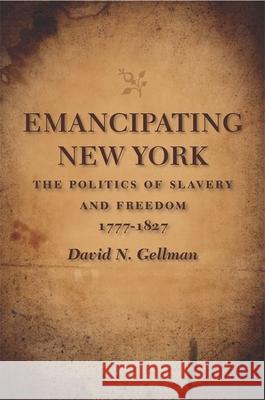Emancipating New York: The Politics of Slavery and Freedom, 1777-1827 » książka
Emancipating New York: The Politics of Slavery and Freedom, 1777-1827
ISBN-13: 9780807133682 / Angielski / Miękka / 2008 / 312 str.
An innovative blend of cultural and political history, Emancipating New York is the most complete study to date of the abolition of slavery in New York state. Focusing on public opinion, David N. Gellman shows New Yorkers engaged in vigorous debates and determined activism during the final decades of the eighteenth century as they grappled with the possibility of freeing the state's black population. The gradual emancipation that began in New York in 1799 helped move an entire region of the country toward a historically rare slaveless democracy, creating a wedge in the United States that would ultimately lead to the Civil War. Gellman's comprehensive examination of the reasons for and timing of New York's dismantling of slavery provides a fascinating narrative of a citizenry addressing longstanding injustices central to some of the greatest traumas of American history.
In an innovative blend of cultural and political history, David N. Gellman has written the most complete study to date of the abolition of slavery in New York State. Focusing on public opinion, he shows New Yorkers engaged in vigorous debates and determined activism during the final decades of the eighteenth century as they grappled with the possibility of freeing the states black population. In 1799, gradual emancipation in New York began-a profound event, Gellman argues. It helped move an entire region of the country toward a historically rare slaveless democracy, creating a wedge in the United States that would ultimately lead to the Civil War.Gellman presents a comprehensive examination of the reasons for and timing of New Yorks dismantling of slavery. It was the northern state with the greatest number of slaves, more than 20,000 in 1790. Newspapers, pamphlets, legislative journals, and organizational records reveal how whites and blacks, citizens and slaves, activists and politicians, responded to the changing ideologies and evolving political landscape of the early national period and concluded that slavery did not fit with their states emerging identity. Support for the institution atrophied, and eventually the preponderance of New Yorks political leaders endorsed gradual abolition.The first book on its subject, "Emancipating New York" provides a fascinating narrative of a citizenry addressing longstanding injustices central to some of the greatest traumas of American history. The debate within the New York public sphere over abolition proved a pivotal contest in the unraveling of worldwide slavery, Gellman shows, and set the stage for intense political conflicts in the nineteenth century.











